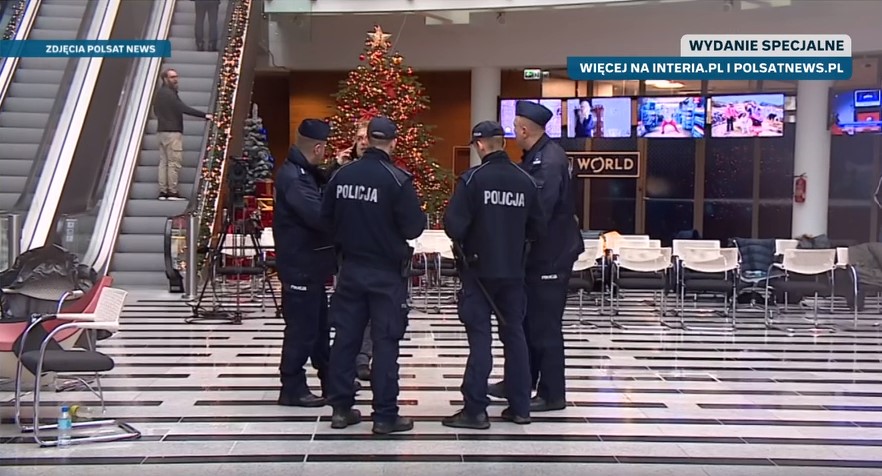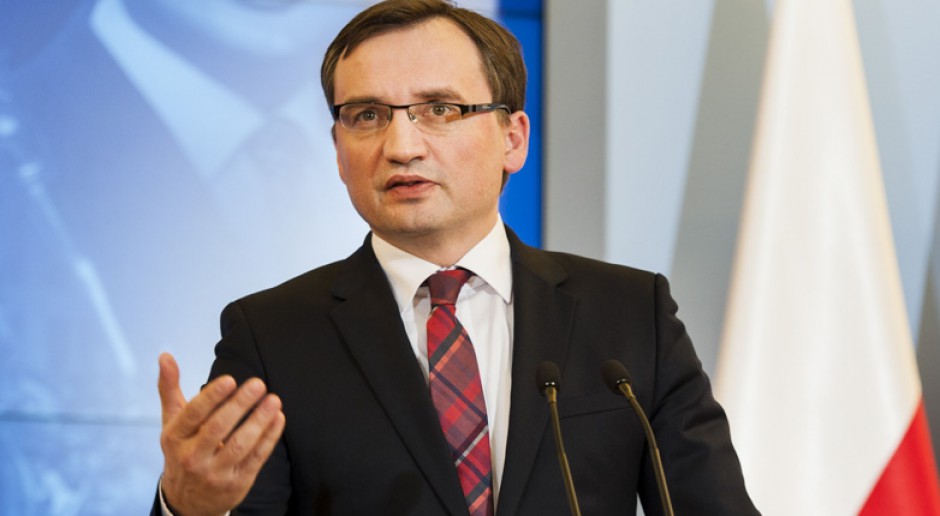Can the Right regain power in Poland after losing the battle for the public media? (Interview)

A conversation with Professor Antoni Dudek of Cardinal Stefan Wyszyński University about what might happen in Poland after the forceful and extra-legal takeover of the public media by Donald Tusk’s government. This interview was conducted by Ryszard Gromadzki for the Do Rzeczy weekly. Professor Antoni Dudek is a well-known and respected historian and political scientist in Poland as well as the author of many successful books, including one that is updated every few years under the title of The Political History of Poland 1989-2023 (Historia polityczna polski 1989-2023).
***
Could the way in which Donald Tusk’s government took over the public media be political fuel for Law and Justice (PiS), and something for its supporters to rally around after losing the October 15 election? Will Jarosław Kaczyński’s party succeed in mobilizing public opinion in defense of the public media?
I have the impression that, through its actions in defense of the public media, PiS can consolidate only its most hardcore supporters. This is evident from the demonstrations that have taken place outside the public television (TVP) building so far, where perhaps 200 people gathered at its climax. If it was an issue that really moved people, more would come.
We will see how many people will come to the demonstration that has been announced for January 11. It is likely that there will be a lot more people, but I do not think it will change anything. Especially after the revelation of how much TVP stars were paid for ineffective – as it eventually turned out – anti-Tusk propaganda.
In my opinion, the dispute over the public media will not bring any new supporters to either side. This is also true for Tusk and his government. Both sides will actually lose. Which one loses more? This I do not know. The polls will show this as things unfold. However, I would be surprised if support for PiS suddenly reached the 40 percent ceiling again.
In addition to all this, I feel that this dispute is of interest to a limited group of people. The issue of changes at TVP is important to those with a strong interest in politics, as well as the journalistic community, so this topic is still being discussed in the media. But people are mostly concerned with other issues than whatever happens to TVP.
Law and Justice censors and propagandists as defenders of “freedom of speech”
The way in which the new parliamentary majority took control of TVP, ignoring the existing laws and even shutting down some TVP channels for a while, may indicate that the unwritten pact that has been in force in Poland for more than 30 years, guaranteeing de facto immunity for political opponents when one side takes power, has now been broken by Tusk, hasn’t it? Can the conflict between the two sides only get worse now?
It is too early to answer this question. However, I have the impression that this is a change similar to those we have seen before. Sooner or later, new government teams always took control of the public media, staffing them with their own people. Tusk’s team just took a “shortcut” and established a new rule, deciding to carry out this operation using extra-legal means.
Under Tusk’s first government in 2007, it took four years to take over TVP, because President Lech Kaczyński stood in the way and Tusk didn’t have the courage to take the path he’s taken now. Now that the president is once again not from Tusk’s Civic Platform (PO) party, it was decided to act without following the law, which I think was a mistake on Tusk’s part.
In my opinion, he could have tried to find an agreement with President Duda. In such a case, he could have gotten President Duda to sign a bill within a dozen days to abolish the National Media Council [which was created by PiS] and restore the role of the National Broadcasting Council [that is provided for in the Constitution], along with changes in its composition reflecting the current balance of power in the Sejm. It was simply a matter of negotiation.
I have a feeling that President Duda was ready for such negotiations, as he was never a big enthusiast for TVP in the way it was run by [PiS appointee] Jacek Kurski. Duda even tried to get rid of Mr. Kurski at least once. As a matter of fact, TVP was programmed by Kurski. Even during the time when Kurski was no longer there [after September 2022], it was still the same at TVP.
Tusk, however, did not even try to get along with the president. In my opinion, he does not want any agreement. Tusk wants a war with Duda. He is looking to completely marginalize the president. The TVP issue is only a prelude to a more general test of strength.
Are you referring to the conflict over the National Judicial Council and the Constitutional Tribunal?
Exactly, yes. To this should be added the prosecutor’s office, for the reason that we now have two centers of power in a situation that was inherited from PiS. There is Justice Minister Adam Bodnar as attorney general and Prosecutor Barski at the head of the National Prosecutor’s Office. We are already seeing the first manifestations of this conflict, as some prosecutors are questioning some of Bodnar’s decisions as attorney general. This will be another field of confrontation, one which will be far more important for the functioning of the Polish state than TVP.
But as for TVP, I think this is the last such big conflict over it, as we are facing the beginning of the end of big media. The era of large TV stations is coming to an end before our eyes. In a few years, there will be nothing left to fight for. Of course, I would prefer that the Tusk government would come to an agreement with the president on this issue, and that some kind of plurality of power in television could be restored. But with the current level of polarization, this is absolutely impossible, so instead of a PiS TVP, there is going to be a PO TVP, and that’s it.
Having been marginalized by Tusk, President Duda retaliated by vetoing a budget amendment bill that contained financing for public media. He also has the so-called “nuclear option” in store, meaning he may not sign the budget bill and instead refer it to the Constitutional Tribunal – which would then allow him to dissolve parliament and call early elections. Is President Duda a tough enough player that he would be ready for such a move?
Andrzej Duda was able to stand up to PiS leader Jarosław Kaczyński on several occasions, such as when he vetoed Justice Minister Ziobro’s judiciary reform bills in 2017, or when he later vetoed the “Lex TVN” law [on foreign ownership of private television channels in Poland], or precisely concerning the issue of public media, when he demanded the resignation of TVP chairman Jacek Kurski. On this occasion, by the way, he was treated very badly by Kaczyński, and to put it bluntly, he was deceived by him.
At the same time, however, Duda was aware that PiS needed him. The showdown with Tusk is going to be incomparably more brutal. President Duda now has a governing political camp against him that wants to turn him into a scapegoat. He has to decide which end to his presidency he wants: a confrontational one or a more conciliatory one. I was under the impression that the first signals the president was sending regarding the budget amendment bill before he vetoed it indicated that he was somehow trying to find an agreement with Tusk.
The statement at the National Security Council meeting [that brought the president together with the prime minister, cabinet members, and party leaders] was in particular very conciliatory. But he has not received any response confirming the other side’s readiness for talks.
In my opinion, Tusk cut off any such attempts and ordered Culture Minister Sienkiewicz to conduct an operation by force [to take control of the public media] in the style we remember from the days of PiS Defense Minister Macierewicz’s actions. We’ll see what happens next. The TVP issue is just the first gambit. Let me emphasize this: it is a front as spectacular as it is unimportant.
The real game will begin around the state budget and the subsequent battles in the Sejm that are most especially related to the judiciary. The Tusk government will have to start acting on the basis of the law. The announced law on [same-sex] civil partnerships, changes in the judiciary, or even the promised abolition of the Central Anti-Corruption Bureau (CBA) – all of these must be carried out in a lawful manner.
Poland allowed to violate rule of law if ruled by pro-EU liberals
In short, in the next year and a half, in my opinion, nothing really significant can be done in Poland without the president. This is the system we have.
The most fundamental question to answer is therefore: Will there be some kind of agreement with the president, or will we have permanent war? I’m betting more on the latter, unfortunately, because it will allow Tusk to hammer home the idea that “I’d do a lot of good things for you, but that terrible Duda won’t let me.”
If things go this way, Duda will find himself attacked by all the media who support this “cordon sanitaire coalition.” Will PiS defend the president? Probably yes, because it will have no other choice. Judging by the way in which PiS leader Jarosław Kaczyński has spoken about President Duda concerning the TVP issue recently, however, it is clear that he can’t even hide his dislike of him. This is astonishing, because in my opinion President Duda is Law and Justice’s last resort in the current situation.
This could be part of a broader reflection on the strategy pursued by the PiS leader over the past two years, when PiS polls fell below 40 percent, derailing its chances of staying in power. I must admit that I don’t understand it at all.
Could the type of permanent war against the Tusk government you mentioned give President Duda the leading role in the Law and Justice party?
In theory, that could be the case. The problem is that within PiS itself, President Duda has never been respected. He could hypothetically earn this respect over the next year and a half through some expedient moves to make the situation more difficult for Tusk, but he himself doesn’t really want this.
In my opinion, Duda would like to somehow reach an agreement with Tusk in order to complete his presidency on his own terms. He does not want to go to total war with the prime minister. He’s never been the warrior politician type. Duda has always been a negotiating politician, seeking compromise – which, by the way, many Poles liked. This is why they elected him president twice.
What appeals to so many Poles in turn irritates Kaczyński, who believes the president should now be much more dynamic and tough. From this, I believe, came at least some of the tensions between them in the past.
Hypothetically, therefore, Andrzej Duda could fight for the leadership of the Law and Justice party, and it seems to me that this is the goal of Marcin Mastalerek, his chief of staff. In my opinion, Mastalerek is the one trying to reorient the president toward fighting for Kaczynski’s political legacy. But this will be extremely difficult because of the president’s personality traits. He is not a natural-born party leader. Being a party leader is a very rare skill.
One of the German media’s correspondents in Poland, Klaus Bachmann, recently “hinted” to the new Polish authorities that Law and Justice should now be permanently placed behind a “cordon sanitaire,” like the right-wing AfD party in Germany, so that its “assault on democracy” can never happen again. Is this scenario now coming to fruition?
This plan has already been put into practice, which is why I call the coalition that was formed after the October 15 elections the cordon sanitaire coalition. It wasn’t Bachmann who invented the term, it was me. I have been saying this for a long time.
It can be said that Donald Tusk’s greatest ally in forming this cordon sanitaire coalition was… Jarosław Kaczyński. For the past two years, when the PiS polls fell below 40 percent and one could forecast what ultimately came to pass on October 15, namely that PiS would have the largest group in the Sejm but would not have a majority, Kaczyński has not made a single move – and I insist on this: not a single move – to win over some other political party outside the PiS-led United Right coalition, with the idea that it could become a coalition partner for Law and Justice.
In other words, in the last two years of PiS rule there has not been a single gesture made toward the right-wing Confederation, the PSL agrarian party, the Left, or the centrist Hołownia Movement. All of them were classified as being on par with the PO-led Civic Coalition as more or less anti-Polish groups that were in the service of foreign powers.
In such a situation, it was not that difficult for Tusk to build a cordon sanitaire coalition, although this was not realized in the form of a single electoral list. Presumably, PiS leader Jarosław Kaczyński assumed that if the opposition went to the polls not on one list, but on three, it would be enough to remain in power. It was not enough, however.
The end result is the Sejm we have today. Law and Justice’s coalition capacity was brutally tested during Prime Minister Morawiecki’s two-week “mission” to form a new government. Its lack of credibility was simply embarrassing.
The cordon sanitaire coalition is therefore a viable project. The question is: How long will it last? I believe that the biggest threat to its cohesion is not at all that Kaczyński and his people will manage to win over PSL’s leader, Władysław Kosiniak-Kamysz, and that suddenly there will be a change of alliances and PiS will regain its majority in the Sejm. This is not going to happen in the foreseeable future.
But the cordon sanitaire coalition could break down over the dispute between Warsaw’s Mayor, Rafał Trzaskowski [from Donald Tusk’s PO], and Sejm Speaker Szymon Hołownia [from the Poland 2050 party] over who should run for president. Both have the desire and a chance to win the presidency, and there can only be one president, so one of them will have to bow to the other. The question is: Under what circumstances will this happen?
The chances of their coming to an agreement are not great, so the conflict between Trzaskowski and Hołownia over the country’s presidency will be the biggest threat to the cordon sanitaire coalition in the new year.
But Jarosław Kaczyński also has a big problem with this, as he has less than a year to find and start promoting “Duda 2.0” – that is, a presidential candidate who would have a chance of winning the 2025 elections. At the same time, this candidate will have more of an uphill battle than Andrzej Duda did in 2014.
It would have to be someone with very different qualities from Andrzej Duda. Someone who would reach the younger generation of Poles with his or her message, operating effectively in a completely changed social landscape…
This is also true. But above all, it would have to be someone who would completely change Law and Justice’s 2015 narrative. By 2025, this narrative will be completely obsolete. It is no longer possible to win elections, as 2023 showed, with social slogans alone, and on the other hand with very aggressive rhetoric, such as that which sought to depict all their competitors as foreign agents.
This is basically what the Law and Justice party’s rhetoric has boiled down to in recent times. If it follows the same line in the 2025 presidential campaign, this will not bode well for its chances of success. It should also be remembered that before this battle, PiS faces two other battles in the first half of this year: namely the local elections and the European Parliament elections. They will determine PiS’ condition in the fall, when they will have to promote “Duda 2.0.”
This interview was first published in Polish in the Do Rzeczy weekly in January 2024.



